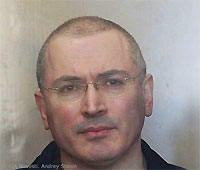Ordinary Russians React to Khodorkovsky’s Release

(Moscow Times – themoscowtimes.com – Gabrielle Tétrault-Farber – December 23, 2013) The announcement of Mikhail Khodorkovsky’s release after 10 years of imprisonment has garnered mixed reactions from the Russian population, which remains torn between acknowledging the former oligarch’s hardships and despising him for the riches he acquired in the 1990s.
President Vladimir Putin made the surprise announcement that he would pardon Khodorkovsky on Thursday and decreed his release on Friday, shortly after the State Duma passed legislation granting amnesty to other political prisoners, most likely in an effort to soften Russia’s image before the Sochi Winter Games.
“I think Putin is trying to be a good boy,” said 31-year-old Alexander Sogulov, a part-time actor. “Maybe he wants to look good for Europe or America.”
Khodorkovsky, the former head of Yukos, Russia’s largest oil producer before its assets were sold off to state-owned companies in 2006, challenged Putin’s authority in the early 2000s, funding opposition parties that were then powerful enough to block the Kremlin’s legislation in the Duma.
At the time of his arrest in 2003, Khodorkovsky was largely despised by the Russian population, which was resentful of how oligarchs unethically acquired their fortunes through the privatization of strategic sections of the economy in the 1990s.
“Khodorkovsky should remain in prison,” said Boris Ivanov, a 64-year-old construction worker, sipping from a can of Baltika beer on a park bench in northern Moscow. “He is a thief.”
“Some people here eat a pickle a day while others get fat. Why should someone who stole the people’s money be let out of prison? I do not think Putin made the right call on this.”
Ivanov also linked Khodorkovsky’s past as an oligarch to Russia’s meager pensions.
“I still work because I have to. I cannot live on my pension. They [the oligarchs] stole everything after the collapse of the Soviet Union. We lived much better during Soviet times.”
Other Russians feel that Khodorkovsky’s lengthy prison term was not an adequate punishment.
“They would have shot him a long time ago in China,” said Alexander, a Lenin impersonator on Red Square. “If you stick your nose where it does not belong, you are going to get punished.”
But over the last decade, Russians seemed to have softened their attitude toward the fallen oligarch, whose time in prison quickly became a symbol of repression under Putin’s rule.
In 2005, Khodorkovsky wrote a series of articles in Vedomosti newspaper in which he proposed that oligarchs pay taxes for the companies they had acquired and deplored the business practices of the privatization era.
Khodorkovsky, who earned a reputation for his austerity in prison, continued to write from jail and correspond with Russian writers about the state of Putin’s Russia.
After Khodorkovsky was convicted of stealing oil and selling it abroad at higher prices in 2011, the Russian public became increasingly aware of the political nature of his prison term.
“Khodorkovsky is a person after all,” said Alexander Shinak, an inspector in the Moscow metro. “Whether or not a person is a thief, 10 years in jail is more than enough. They really ruined his life.”
“I personally did not worry much about Khodorkovsky’s time in jail,” said Anna Panina, a university student. “But I still think that a 10-year sentence is way too long. Some murderers do not even get that much time in prison.”
During his first years in office, Putin sought to limit the oligarchs’ influence, including that of some of his former supporters. Putin forbade them from engaging in political activity and re-established state control over their companies.
Those who did not abide by Putin’s rules like Khodorkovsky exiled themselves or were imprisoned.
